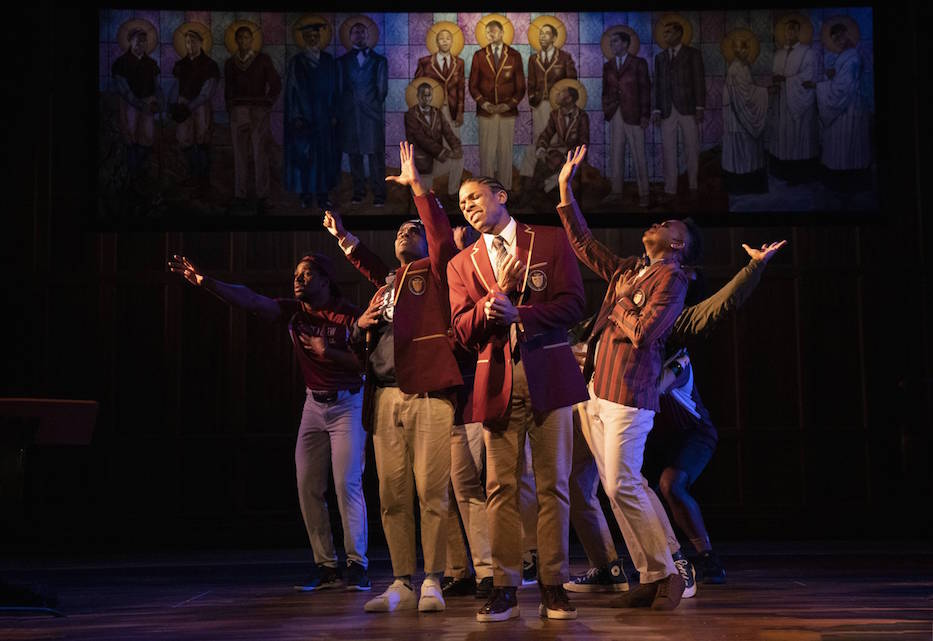
LGBTQ | Music | Arts & Culture | Theater | Yale Rep Theatre | Arts & Anti-racism
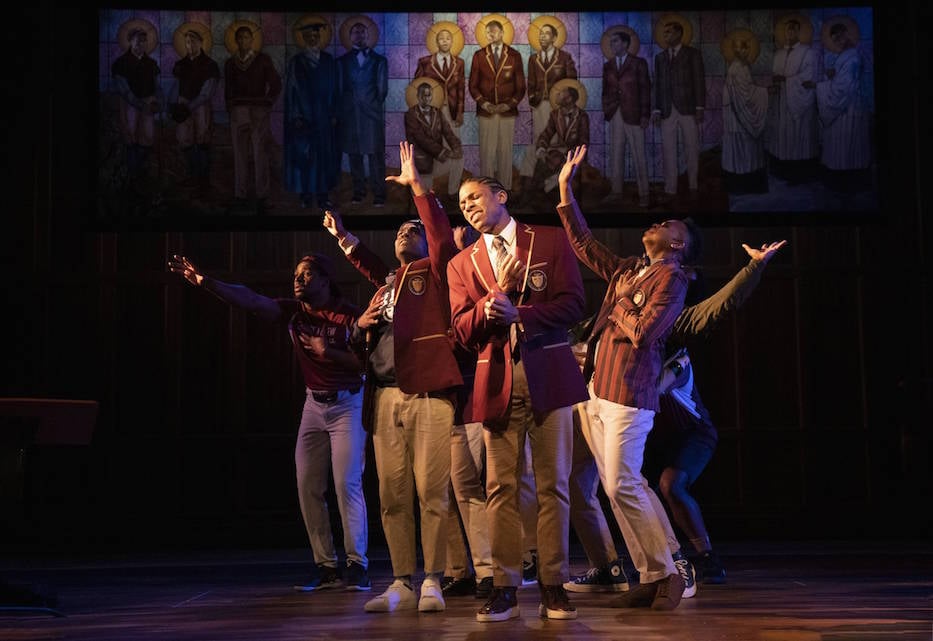
Aaron James McKenzie with members of the cast in a scene from CHOIR BOY by Tarell Alvin McCraney, directed by Christopher D. Betts, Yale Repertory Theatre, March 31-April 23, 2022. Joan Marcus Photo.
It's hard to say whether the voices or the footfalls come first. From stage left, a lone verse floats, heavenly and clear, into the theater. I! Hear! Ro-ck-in’ in the land! Rockin in the land and ringin’ them bells. Voices swell around it. Feet hit the stage in time with each other. Arms windmill through the air. By the time David (Aaron James McKenzie) steps forward to talk to his father on the phone, the stage is bathed in blue and has become a full-fledged step routine. His voice cuts through the sound.
That ability to strike a balance—thunderous and quiet, bitter and sweet, past and the present— lies at the core of Tarell Alvin McCraney's Choir Boy, running at the Yale Repertory Theatre through April 23. Directed by Christopher D. Betts with an explosively talented cast and crew, the work is a coming of age drama, musical tour de force, and exploration of queer and Black masculinities that rarely get to see a main stage. At its best, it uses both spirituals and contemporary music as a bridge, telling the story of the present with songs drenched in history.
Set “last year” at the fictional, all-Black Charles H. Drew Preparatory School for Boys, Choir Boy follows student Pharus Jonathan Young (Israel Erron Ford), whose queerness is something of an open secret at the school. McCraney chronicles a full year, during which Pharus is tapped as the choir lead, characters work to complete their junior and senior years, and Pharus tests how fully he can be himself within the confines Christianity, music, his own Blackness and that of his classmates.
When we meet him, he is one verse into the school’s song “Trust and Obey,” and already fending off homophobic vitriol from his classmate Bobby (Anthony Holiday), whose lips have a way of curling up into a reddish-pink snarl. Around him, the other boys continue to sing as if nothing has happened. When Pharus turns around to glare at Bobby, it lands him in the headmaster’s office, and launches the play into being.
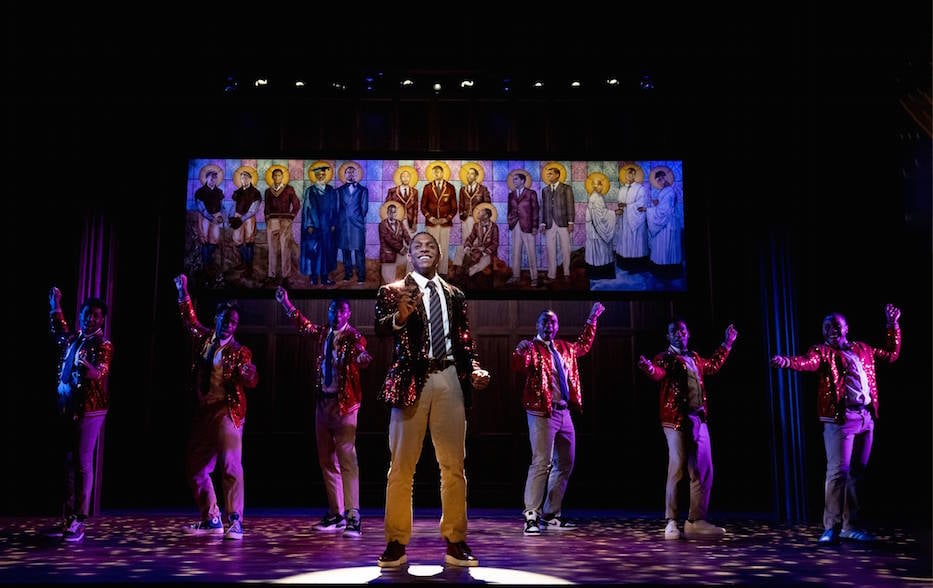
Aaron James McKenzie with members of the cast in a scene from CHOIR BOY by Tarell Alvin McCraney, directed by Christopher D. Betts, Yale Repertory Theatre, March 31-April 23, 2022. Joan Marcus Photo.
From that moment, the audience is deep in this world, which feels both removed from and intimately familiar to New Haven. The city does not have an analogue to the Drew School—elite prep schools like Foote and Hopkins are places where Black students have spoken out about not feeling safe, in fact—but it is a place where the legacy of Black education and educators runs deep. Just blocks from the play’s York Street stage, the city is still home to thriving chapters of Black Greek organizations and community incubators including the Q House, ConnCAT, Stetson Library, and ConnCORP. It’s hard not to see the show and feel a pang for what could have been the country’s first HBCU, thwarted by both the city and Yale in 1831.
This is McCraney’s introduction to a universe that feels deeply relatable—and also one of immense possibility. In this sense, Pharus is the very beacon of light that his name suggests, guiding the audience through a year in which his presence as a gay student is at turns maligned, feared, questioned, accepted and euphamized (to some of his classmates, he is called everything but his name; to the headmaster, he is “gifted” and “special,” but also extra enough that he’s asked to tone it down). As he takes the character on, Ford is exceptional: his Pharus has a six-octave range and then some, with a voice that starts in his ribcage and can go right through the roof of the theater.
When he refers to his voice as sacred—and his ideal partner as Jesus—it’s not just a laugh line but a window into a life built around and in music. That voice is angelic and muscled, ethereal and cavernous, sometimes edging on a primal scream. Ford is just as compelling in movement—the audience learns about him in the shift of his panicked eyes, the way he can lift his whole body and then make himself small, the twitch of his mouth as he tells his roommate A.J. volumes without saying a single word.
In every moment that he is onstage, Ford gives the audience the sense that he does not want your pity or protection, but your understanding. It makes the ending, which McCraney paints as somewhat inevitable, all the harder to sit with long after the lights have come back up.
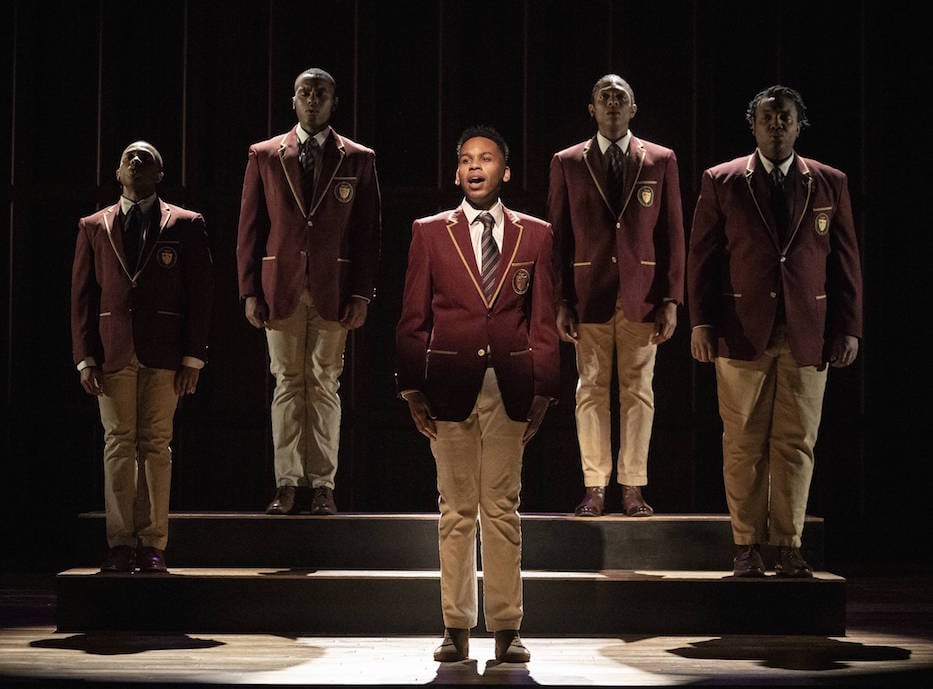
Jarrett Anthony Bennett, Malik James, Israel Erron Ford, Aaron James McKenzie, and Anthony Holiday in CHOIR BOY by Tarell Alvin McCraney, directed by Christopher D. Betts, Yale Repertory Theatre, March 31-April 23, 2022. Joan Marcus Photo.
But to say Choir Boy is Pharus’ story alone is to miss the entire point of the show. True to its mellifluous framing, the work is very much an ensemble piece. As Pharus’ classmates emerge (literally—risers erupt from the stage), all of them risk stereotype—and most of them rise well above it. There is the bully (Holiday), who happens to be the headmaster’s coddled nephew, his sidekick Junior (Anthony Justin James), Pharus’ affable roommate A.J., who is a quiet, thoughtful ally (Malik James), and an aspiring pastor and battling his own demons (Aaron James McKenzie as David Heard).
There’s the gentle-but-firm Headmaster Marrow (a winning Allen Gilmore, who thrilled as Malvolio in Carl Cofield’s virtuosic Twelfth Night) and doddering old white professor (Walton Wlison) who punctures this literally sacred Black space. McCraney’s use of step, call-and-response, and 20th century pop culture all live richly alongside each other, with works from L.T.D., New Edition and Boyz II Men as well as spirituals that map centuries of freedom.
In Betts’ able hands, characters feel round and complex, with a deep, sometimes barbed chemistry. As David, McKenzie is a quiet, roiling storm of a human, stunning the audience into silence as he leads the choir in “I Couldn’t Hear Nobody Pray.” Only later does the audience realize that the depth in his voice is also a velvety darkness, into which he may fall at any time.
It’s that complexity that makes McKenzie magnetic on the stage, whether he’s explaining why “I got to be cordial”—a first-generation Drew student, on scholarship and just trying to graduate—pressing his crucifix gently to his lips, or pleading with his father on the phone. As he weaves dialogue through “Rockin’ Jerusalem,” Amy Hall Garner’s brilliant and propulsive choreography blooms around him, binding his personal story to four centuries of Black history, the forward march of time, and the continued economic disenfranchisement of Black people in this country.
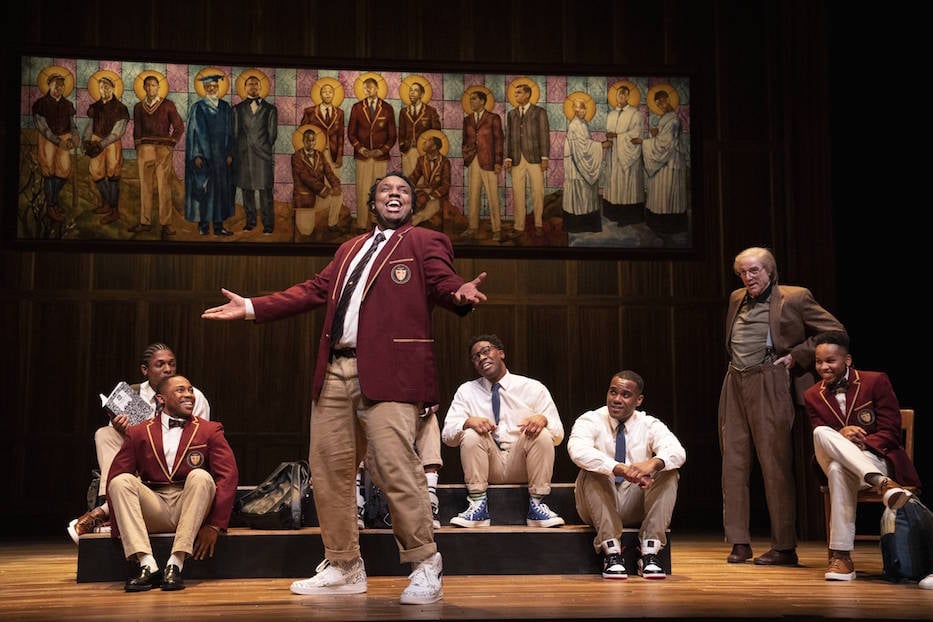
Anthony Holiday with members of the cast in a scene from CHOIR BOY by Tarell Alvin McCraney, directed by Christopher D. Betts, Yale Repertory Theatre, March 31-April 23, 2022. Joan Marcus Photo.
Holiday’s Bobby, too, reveals himself to be far more complex than an insecure and coddled bully, with a sorrow that may swallow him whole. At points, he channels a rage that bubbles to his cheeks and his fists, insisting that the line between right and wrong is black and white. But he’s much more interesting when left to sit with the enormity of his feelings. Even members of the general ensemble (Gilbert Domally, Denzel DeAngelo Fields, Darian Peer and Wildlin Pierrevil) bring it, with an intensity that radiates from the stage out into the audience.
Throughout, narrative is inseparable from the music and movement that flows through it. Allen René Louis’ vocal arrangements are stunning and spacious, with a reach that swings from mourning and grief to lust, longing, shame and awe. Paired with Garner’s choreography, they are unstoppable. They don’t just knit the play together: they allow music that has lasted centuries to become a form of vital communication among characters. As Pharus himself points out, spirituals tether Drew’s students to a history of liberation that they are still figuring out. When he and others interpret them in real time, the result is soul-stirring.
Nowhere, perhaps, is this truer than in an arrangement of “Motherless Child,” performed in low light in the school’s showers (props to scenic designer Anna Grigo, and lighting from Riva Fairhall). As characters, wrapped in their white towels, gather one by one around Bobby, he is able to crumble beneath the silk of the song. The piece, in turn, brings time to a standstill, creating a softness that feels rare, fleeting, necessary.
So too in “What Wondrous Love,” which speaks volumes as ensemble members come on to the stage, wrapped this time in red towels instead of white. It feels like a throwback—deeply intimate, and also that universal moment of seeing something, and not being able to understand the world in the same way.
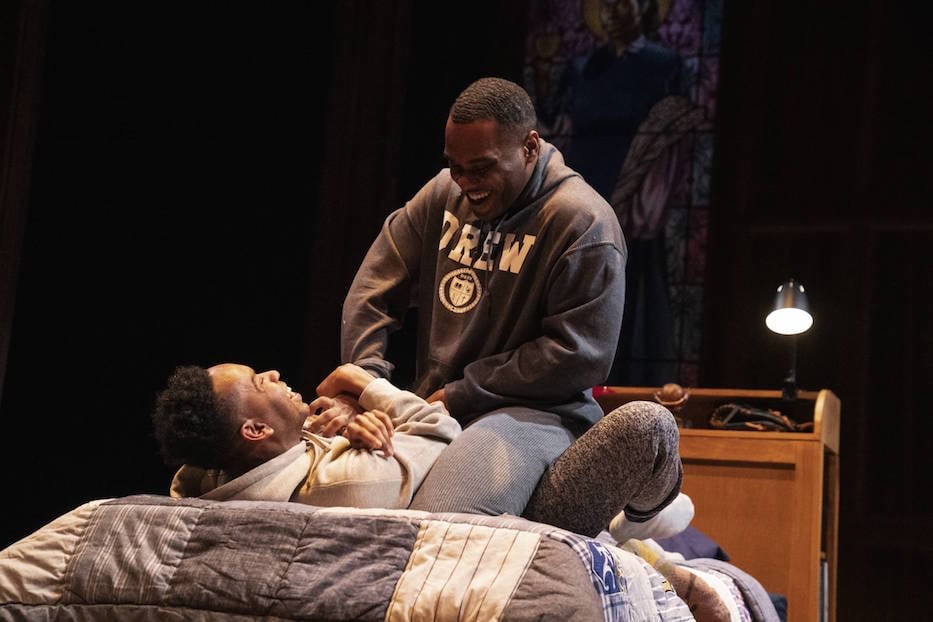
Israel Erron Ford and Malik James in CHOIR BOY by Tarell Alvin McCraney, directed by Christopher D. Betts, Yale Repertory Theatre, March 31-April 23, 2022. Joan Marcus Photo.
It feels like an apt parallel to the process of coming of age. These “Drew Men” are not yet men—they are still boys, struggling to put words to how their voices and bodies are changing, to how they experience platonic and romantic love, to the big ideas in their heads and the fact of their being around each other and out in the world. Some of the richest scenes take place between Ford and Malik James, as they unpack worlds of narrative in lights-out conversations and an impromptu pre-graduation haircut.
It is not a perfect play: the pedantic, doddering old white teacher Mr. Pendleton (Wlison) is perhaps meant as comic relief, but falls into caricature as he plays it for someone who would give Robin DiAngelo an aneurysm and a book topic all in one. While McCraney has an ear for dialogue, characters’ speech sometimes feels stretched or heavy-handed, pulling the audience out of the play as characters circle around plot points. That’s the case in one of the work’s most climactic scenes, as Pharus finds himself at odds with members of the class over whether spirituals are up for re-interpretation.
The moment’s saving grace may be its setting—a high school, where students are genuinely likely to be trying out this kind of florid, sometimes circuitous language to see how it feels. The setting—"a school year, last year”—also makes the work feel current at a time when homophobia is still searingly present in classrooms, churches, and state legislatures across the country. When Pendleton notes Pharus has been reading the late bell hooks—queer canon, to be sure—it’s an opening for a larger discussion that high schoolers should be having in the real world. Isn’t that the point of theater?
At the University Theatre, Grigo has created the perfect container for the show, with a production that is as gorgeous and layered as the music that knits it together. Risers erupt from the stage when the choir is performing, creating a sense of space (and most literally, hierarchy) within the school. Sliding stained glass windows include beatific jocks, haloed students, gowned graduates and saints with their fingers raised to their mouths, in what becomes an informal and ill informed no snitching policy. Fairhall’s lighting, perhaps strongest in the work's two shower sequences, plays lovingly with color and shadow that successfully makes the space into a sanctuary. Costumes from Stephen Marks and sound design from Daniela Hart tie it together.
As it plays in New Haven, the work is a gift. We know these characters—they live in our homes, schools, churches, sometimes inside us. In Pharus, it is hard not to feel the spirit of the late Chuckey Brown moving along the lip of the stage and slipping through the audience, lifting his voice to heaven until it gets there. In Headmaster Marrow, one can feel a through line to James Comer, Jeffie Frazier, Lillie Perkins. David may be that kid you knew at Co-Op High School, who lives in his head half of the time. McCraney has written relatable people, who are grappling with some of the same questions that city residents are in real time.
None of them are completely right all the time. All of them have something to say. It’s just on the audience to lean in and listen.
Choir Boy runs at the Yale Repertory Theatre through April 23. Tickets and more information are available here.

